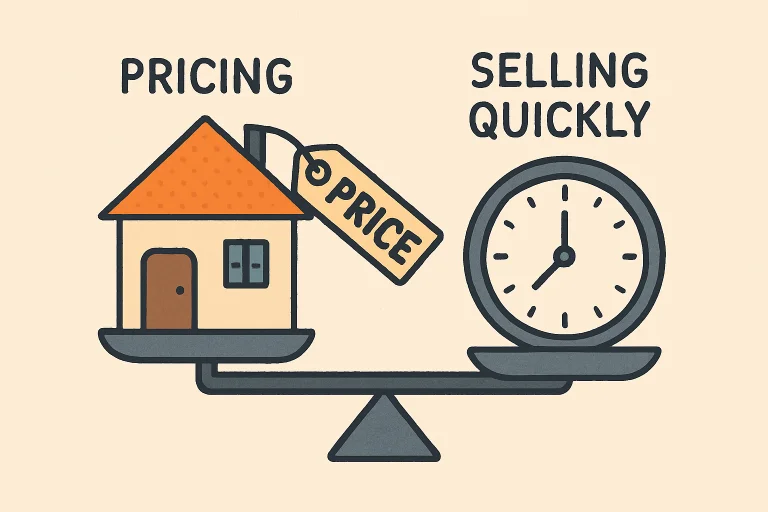The Challenges of Setting the Right Price
Setting the price for your home is one of the most consequential decisions you’ll make as a seller. Many homeowners feel uneasy, torn between the risk of pricing too high resulting in languishing on the market or pricing too low and missing out on potential profit. These dilemmas are real: price too high and you risk scaring away early interest; price too low and may leave money on the table or create suspicion about your home’s value.
Overpricing typically slows down the process and may even result in a “stale” listing, while underpricing can set off a bidding war in rare cases but most often leads to a lower final sale. The average time a home spends on the market is closely tied to its initial asking price, and houses priced correctly from the start tend to sell faster without excessive negotiation.
Assessing Today’s Housing Market Trends
The real estate market fluctuates quickly, driven by economic factors, mortgage interest rates, and local demand. Early in 2024, many markets remain competitive, with buyers including direct buyers acting swiftly on correctly priced homes. Key influences on buyers’ willingness to pay include marketwide inventory, recent sale prices in your neighborhood, school district quality, and broader national economic indicators.
Supply and demand determine your leverage: sellers have more room to negotiate when inventory is low and buyer demand is high. Conversely, a saturated market means buyers, including direct buyers, can be selective, often resulting in longer sales cycles and price drops. Monitoring trends and adapting to these shifts is crucial for a quick, high-value sale.
Comparing Your Home to Recent Sales
One of the most reliable ways to determine a fair price is to research recently sold comparable homes often called “comps.” Start by gathering data on properties similar in size, style, condition, and location. Look for similarities in square footage, lot size, bedroom count, and unique features like finished basements or upgraded kitchens.
Adjustments are key: if your home has one less bathroom or is a few blocks further from a desirable school, account for that in your analysis. Modern online real estate platforms offer powerful tools for compiling and comparing these stats.
The Role of Professional Appraisals
A professional appraisal provides an expert’s opinion of your property’s value and can guide your asking price. Especially in shifting markets or when your home is unique for the area, investing in a pre-listing appraisal can offer peace of mind and a firm starting point for negotiations.
Contrary to some myths, an appraisal doesn’t guarantee what a buyer will pay. Still, it does help anchor your price in proven data giving confidence to reputable buyers that your asking price is fair and well-supported. Consult with your real estate agent to decide if a pre-listing appraisal will strengthen your position or if standard comparative analysis will suffice.
Adjusting Price Based on Feedback
Your first few weeks on the market are telling. Monitor showings and feedback: if you see lots of interest but no offers, your price may remain above market value. If there are few showings, a steeper reduction might be necessary.
The optimal approach is to act quickly. Homes that undergo their first price adjustment within three weeks of listing generally recover more buyer attention than those that wait longer. After open houses, discuss the prevailing feedback with your agent and be ready to adjust the price and your marketing strategy if competition intensifies.
Timing and Its Impact on Pricing
Real estate is inherently seasonal. In most markets, spring and early summer see the most buyer activity, which can allow you to command a higher price or sell your home quickly. Listing during periods of high inventory can require price flexibility knowing when to act may mean the difference between a fast, lucrative deal and weeks of uncertainty.
The most successful sellers are those willing to adapt their strategy as market conditions evolve. Flexibility is key: watch local data and national trends to pivot as needed.
Final Thoughts
Setting the right price is both an art and a science. By carefully analyzing market trends, recent comparable sales, and buyer psychology, you can quickly position your home to attract serious interest while protecting your financial goals. Partnering with professionals agents, appraisers, and market analysts adds insight and confidence to your pricing decisions. Staying flexible, responding to feedback, and timing your listing strategically will help ensure a faster sale at a fair value. Ultimately, the right price sets the stage for a smooth transaction, satisfied buyers, and a successful closing.

